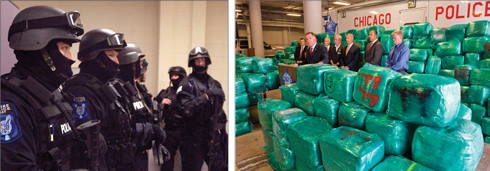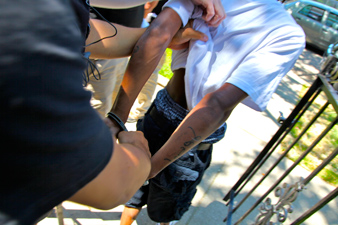President Obama halt the 'war on drugs,' and war on Blacks, says coalition
By Askia Muhammad -Senior Editor- | Last updated: Apr 9, 2013 - 2:16:17 PMWhat's your opinion on this article?

(L) The Racine Police Department SWAT team members, along with other local and federal law enforcement attend a pre-dawn briefing, before executing six search warrants within minutes of each other in Racine, Wisc. (R) Chicago Police Superintendent Garry McCarthy speaks at a news conference with other law enforcement officials in Chicago, June 28, 2012, where they showed off more than eight tons of marijuana authorities found in a tractor-trailer.
|
Many in the group of social justice, drug policy and criminal justice reform advocates were ex-offenders and they intensified their call for an end to the War on Drugs, and to demand increased government investment in jobs, economic development and social programs to combat the “state of emergency in the dark ghettos” of Black America. The War on Drugs they declared has failed to eradicate the drug menace but instead has turned out to be a war on Black and Brown youth, turning millions into felons for behavior that should be treated as a medical problem, not a criminal problem.
“Millions of Black people know the truth, the War on Drugs is a War on Us,” Dr. Ron Daniels, president of the Institute of the Black World 21st Century told reporters. “The War on Drugs is a racially biased policy—the ‘New Jim Crow’—which has disrupted and devastated Black communities across the country.

In a June 5 2012 photo, police arrest a suspect in Chicago. The CPD narcotics division had been conducting undercover investigations in order to move in on suspected drug dealers in parts of Chicago’s South and West sides.
|
The activists said they are not relying only on a charitable gesture from the White House, they announced a day of direct action schedule for Monday June 17, to coincide with the anniversary of the establishment of the drug war in 1971, and with the observance of Father’s Day.
The day of action will be preceded by Father’s Day observances by the faith community in the greater Washington-Baltimore area to educate congregations and to mobilize participants for the June 17 rally at Lafayette Park, across the street from the White House.
The criminal justice component of the day of action is important because the War on Drugs has exploded the numbers of incarcerated persons, creating millions more young people with felony convictions on their records, making them virtually unemployable. “It’s like we’re still serving time,” Courtney Stewart, leader of The Reentry Network for Returning Citizens told reporters.
“Approximately 10 percent of the District of Columbia population has had some involvement with the criminal justice system, many of them were previously incarcerated for non-violent and minor offenses, yet they face tremendous difficulties in rebuilding their lives when returning home to the community,” he said.
It can typically take from nine months to two years before a formerly incarcerated person can find employment, Mr. Stewart pointed out. During that period as many as half of those who were incarcerated will return to jail during a period of prolonged joblessness and dependence on family for support. Mr. Stewart recalls actually sleeping on his mother’s floor for months after returning from D.C.’s Lorton Reformatory in 1985.
“For far too long, this nation has ignored the myriad crises in urban, inner-city neighborhoods, choosing instead to substitute paramilitary policing tactics like stop-and-frisk, tougher sentencing, and mass incarceration for social, economic and racial justice,” Dr. Daniels continued.
“Black people marched on ballot boxes in overwhelming numbers to ensure the re-election of President Obama. Now it is time for the president to directly respond to the state of emergency in America’s dark ghettos by having the audacity to end the War on Drugs and vigorously promote investment in jobs, economic and social programs to heal Black families and communities.”
The day of action’s coalition is calling on President Obama to: issue an executive order terminating the War on Drugs and replacing it with a national initiative that treats drugs and drug addiction as a public health issue; issue an executive order ending the practice of using incarcerated persons as prison labor; and intensify efforts to eliminate the disparity in sentencing between powdered cocaine—for which most offenders are White—and crack cocaine, for which most offenders are Black.
Without strong, reliable support it is easier for returning citizens to slip back into the prison pipeline than it is to escape and find a place in society.
“In my particular situation, I had got caught multiple times and didn’t stop” selling drugs, 23-year-old Ivan Cloyd said in response to a question from The Final Call about ways to prevent young people from behavior that might lead to their arrest in the first place. “I needed some assistance from someone else, or from a group to work with me. It just didn’t happen overnight.
“Because my initial response was just something that I just thought naturally happens in my community, which is sell drugs. But somebody taught me. And I made mistakes. I had one foot in and one foot out. I was playing 50-50 at one time. I’mma do this. But when you need groceries on the table and rent paid you know, that’s the sacrifice you make.
“But somebody worked with me and brought me to the table to be able to keep going forward in the right direction, and didn’t give up on me and helped me bring my hopes and dreams true,” Mr. Cloyd testified.
“Young people are ready” for a new way, Mr. Stewart said. “They are not ready for rhetoric, but they are ready if you are (going to be) committed” to really help them change their lives for the better.
“Our goal is to end this inhumane discrimination, educate the public, seek transparency and accountability and most of all help to improve the quality of life for those who want to enter back into our communities successfully,” said Mr. Stewart.
INSIDE STORIES AND REVIEWS
-
-
About Harriett ... and the Negro Hollywood Road Show
By Rabiah Muhammad, Guest Columnist » Full Story -
Skepticism greets Jay-Z, NFL talk of inspiring change
By Bryan 18X Crawford and Richard B. Muhammad The Final Call Newspaper @TheFinalCall » Full Story -
The painful problem of Black girls and suicide
By Charlene Muhammad -National Correspondent- » Full Story -
Exploitation of Innocence - Report: Perceptions, policies hurting Black girls
By Charlene Muhammad -National Correspondent- » Full Story -
Big Ballin: Big ideas fuel a father’s Big Baller Brand and brash business sense
By Bryan Crawford -Contributing Writer- » Full Story






 Click Here Stay Connected!
Click Here Stay Connected!








